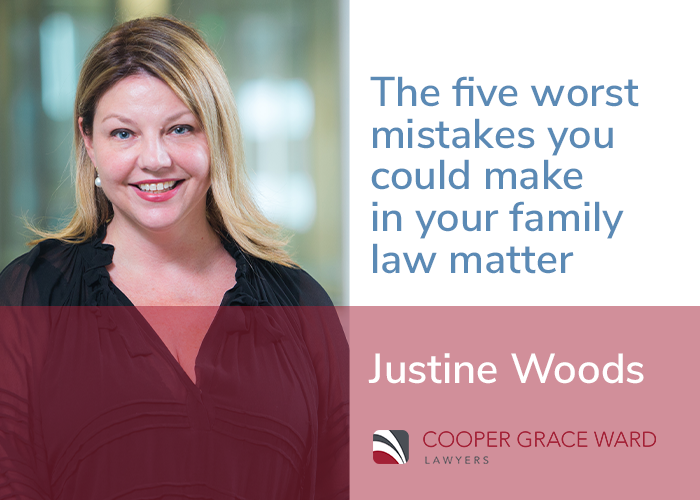In this video, CGW family law partner Justine Woods talks us through the top five worst mistakes clients commonly make in their family law matter.
VIDEO TRANSCRIPT
Hello, Hello, there. I’m Justine Woods, the family law partner at Cooper Grace Ward. Now, this might not be very pleasant, but I thought I might run through some of the worst mistakes that I see people make in their family law matters.
Family law mistake 1 – expecting the other person to change
So, in terms of practical arrangements, I find that sometimes people will think that they’re going to have a trial separation, or that they’re going to force the other person’s hand by taking a certain step. For example, if a relationship has been in some difficulty, I do find that one spouse will often say, well, I’m going to wait to think about it for a while hoping, without necessarily expressing this hope that the other person will put up a big fight for them, pursue them say, come back.
But sometimes that backfires terribly and the other person says no, no, I think we should actually separate and make that final.
Now, that’s just a normal human interaction. Where it becomes problematic in a family law matter is if, for example, the person trying, the trial separation has left the children with the other parent, or taken certain steps about a residence, for example, that other spouse can then try and capitalise on that advantage and, for example, keep the children. Now there are plenty of remedies for that and many things that your family lawyer can do for you about that. But it takes some time and if there’s no agreement, it might be months of time, before that can be corrected.
So, sometimes things just happen and there’s no good way to really address that. But if that’s something that’s happening to you personally, get advice before you take the steps because, as I say to clients, it’s a great deal easier to negotiate about the larger issues and the more permanent long lasting issues when you have an acceptable arrangement in the interim.
If you’ve taken certain steps or fail to take certain steps, that then mean a certain type of status quo has been created. It just takes a lot of time to address that. People not seeing their children are much more distraught than those who are seeing them and then going through the process.
Family law mistake 2 – relying on an informal agreement
Another big mistake I see is people having an informal, and this is terribly long lasting, sometimes thinking they’ve had a property settlement, dividing what they can, and then potentially years later, the other person pops up and says: ‘Well, I know we divided all of our bank accounts, then and you kept that and I kept this, but now I want some more.’ And it’s incredibly common.
There are some rare cases where an informal agreement has been so significantly implemented, the court has not disturbed that. But the overwhelming number of cases are about saying, well, too bad. You had an agreement two years ago that you didn’t have formalised or ratified in any way, we’re now looking at a current pool of assets, and dividing that current pool, and even if they’re not terribly successful in a financial sense, you’ve then been involved in the court proceeding.
So, I would say even in a very small matter if you don’t have a lot of money, fair enough, but you might have money in the future. So, it can be worth the outlay, both financially and emotionally, to have a family court document or a binding financial agreement that says, well, this is our settlement. Yes, I’m taking my port of clothes and away I go, but there can never be any further claim. So, that’s a big mistake to rely upon.
Now, sometimes people’s word is their bond, and you’ll be a person that I would never see. But I see a great many people who have said, oh, yes, that’s the deal, and then, years later, they’re subject to either a spousal maintenance application in certain circumstances, particularly if they haven’t divorced, or fall on a property settlement application.
Family law mistake 3 – nesting
This is my personal view based on experiential evidence that I see from clients – nesting is mostly a mistake.
Nesting is where you are separated, but the children remain in the house and the parents shift in and out. Now anything on a very short basis, maybe it has utility, but generally, I find causes a lot of conflict. It imposes on the adults’ privacy. You have continued fights about housework and other household duties, which is one of the few measurable benefits of getting separated is no longer having the fight with your spouse about I’ve done all that you’ve done nothing bla bla bla, but no, I did that instead.
So, why have the misery of separation without any of the benefits?
It also is, I think, and I draw this from the family reports that I read prepared by experts in child development, it’s also quite confusing. If you’re separated, you are separated, and it’s immensely painful for children and for everyone involved, and you have to accept that, but try to ameliorate the damage. I don’t find that children living in the same household really appreciate what it means emotionally and so their recovery is delayed, because they’re still in their same house and people’s obsession with the house.
And maybe it’s projection but I do try and talk to my clients about that. So, they say, no, the children need to be in their familiar environment, they’ll be so upset if they’re not. I said, don’t you really mean you will be so upset, because mostly, I find that if the parents are going along alright, and I don’t mean joyously happy, but going along alright, and functioning pretty well, the children will be well too. And so keeping them in the house is not necessarily helpful.
Of course, there are exceptions. So, try and avoid separating during your child’s grade 12 exam block, and shifting them out there. But as a rule, the house is not – that’s not I don’t find from clients’ later reflections – it’s not the big thing that really is of concern to people.
Family law mistake 4 – letting emotion take over
And I suppose my other bit now, again, this is my preference and style is not to fight your emotional issues through your family law matter and I say to people constantly, we keep our financial transactions very separate from our emotional transactions, because effectively, it’s a business deal about money.
The children are different, and an entirely separate category and that’s how it ought to be run. But some people prefer to be as aggressive as they can, during their family law matter and I don’t find it’s often, sometimes it is, it’s financially motivated, but most of the time, it’s because they have all this unresolved hurt and anger and it feels like a really marvellous tool for punishment.
Now, it might punish the other person, but it will punish you too, because the longer that all goes on, the more time you’re giving to it. It can damage the relationship with the children, you’ve got to co-parent with this person you’ve tried to torture.
I would say take the medicine. Have a reasonable outcome, know what that is. Don’t accept, oh, I can’t tell you what you’re going to get. If you consult with someone who said I can’t give you any idea (and I am often asked for second opinions) that’s completely incorrect. It might be not all the information is to hand and you can only give a broader range and say, when I have this extra information, I will be able to make my advice more specific.
That’s in my view what a person is entitled to when they consult their family lawyer. If you don’t get that there’s something wrong, because you ought to know what’s going to happen to you. What is a realistic set of outcomes and then you should be working towards that and thinking all the time, what am I doing now, to advance me to that final set of outcomes?
Family law mistake 5 – not getting help when you need it
So, they’re the types of mistakes to avoid and the other is to fall prey, I suppose to the many cliches in family law.
So, if people say to you, or your spouse says to you, oh you shouldn’t get a lawyer, we can work it out themselves. I don’t find the lovely people who’ve already reached agreement before they come to see me and they say, my husband, or my wife, or my spouse and I have reached an agreement. They never say, oh we don’t need a lawyer. They say we understand the process and we’re going to work it out ourselves and then just have it formalised.
Be deeply suspicious if someone says to you, we don’t need a lawyer. That usually means you don’t need a lawyer because I want you to do what I say you should do.
Further support on family law matters
So, there’s some basic errors that you can avoid. Now sometimes horrible things happen and we have to then reframe and correct after the fact, but there are some mistakes that you can anticipate and avoid if you possibly can. If you need any help doing so please don’t hesitate to contact us at Cooper Grace Ward.





